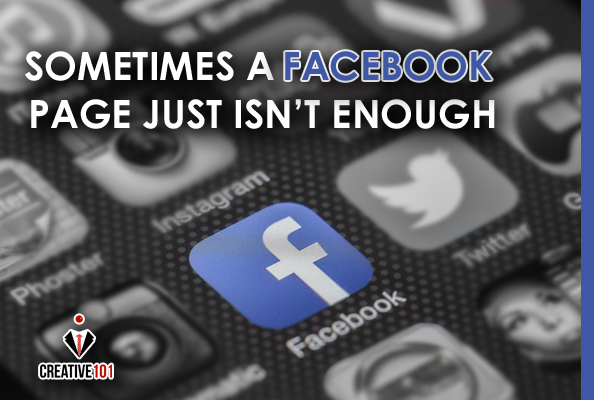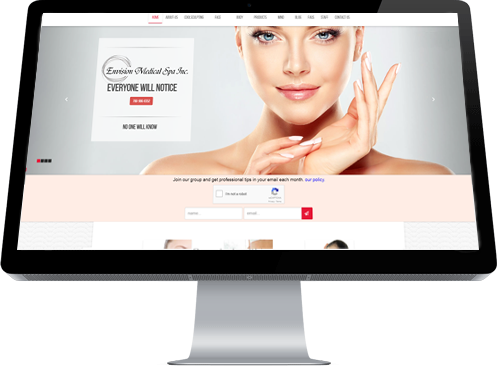
The Secret Things You Didn't Know Your Website Does
How your website helps your business behind the scenes
Your business 'online presence' needs Facebook AND a great website!
In this age of social media, it's pretty common for businesses to think that having a Facebook page is the same as having a website. After all, it gives you an online presence, right? You're visible on the internet, and people can find your business on their computers. What more could you possibly want?
Well, as it turns out, quite a lot, actually. All it takes is a quick Google search to see the impact. Try pulling up a business on your smartphone's navigation app, and you'll quickly realize that a Facebook page isn't enough.
But that's not to say it's as cut-and-dried as all that. Nothing is ever so simple. There are obvious pros and cons to relying on a Facebook page, or even to opting for a build-your-own website. Let's walk through those and compare the benefits for your business.
Facebook: The Bare Minimum
It should go without saying that your business should have a Facebook page. It's just a requirement of business these days, as well as maintaining an active online presence on the platform. But it's certainly not enough to put all your eggs in that basket. The obvious benefits are the very reasons you should have a Facebook page in the first place. Your established fans will be able to find you and connect with your business. Restaurants, for instance, can update their daily specials on Facebook, and regular customers can see what's on offer for the day. That's a fantastic connection, and one every business should seek out.
When it comes to people who are not already fans however, it's not quite so rosy. Facebook isn't great about helping businesses find new clientele, or about helping their users find random new businesses. A preference is always given to those companies who advertise with them, and that can get expensive very quickly for many smaller businesses. Furthermore, if you're a business who really wouldn't benefit from Facebook advertising, then your very existence on the platform will never really grow.
Add to that the simple fact that the under-25 demographic is dropping off of Facebook at a precipitous rate and you start to see the risks.
Build-Your-Own: The Compromise
For many businesses, the build-your-own option can be a great temporary solution. You get some of the benefits of a full-fledged website, with most of the cost savings of a Facebook page. For a relatively low fee, and a bunch of work on your own, you can have a basic, functioning website, that will allow you to establish an online presence.
The trick there is that most businesses, particularly small businesses, are already complaining that they don't have enough time to do all the things they want to do. The most common lament we hear from businesses coming to see us after building their own site is some variation of "I don't know when I thought I'd have time for that."
An effective website does require time and energy -- but let's face it, it also requires money. As the old saying goes, "nothing is ever really free". In order for a build-your-own site to be effective, you have to pay for the options that make it work. An effective domain name, search engine optimization (SEO), even social media integration. Some of the DIY sites will charge you for each piece of that, as well as hosting costs if you want to add too many photos, or online store fees if you want your customers to buy online. It doesn't take long for those costs to add up.
A Professional Site: The Endgame
As a general rule, a proper professional site is what businesses get around to once they've grown enough to need it. Some smaller businesses use them to get established, and that's an excellent strategy, but at some point, every business will need one.
Why? Because without it, you're relying on computer algorithms to help people find you.
Google -- and as a result, most every piece of navigation software out there -- relies on a business' webpage to establish the information about a business that it shows in a sidebar, or in the popup that appears on a map. It would be too easy for people to confuse Google's search engines with false Facebook pages or even Yelp or Twitter accounts. The single item that will most impact your business' visibility and search engine placement is your webpage. Simply put, most of these services operate on the assumption that something that has been paid for is more reliable than something free. If money has been spent on it, it's probably being spent to get it right. This applies to free website services as well.
Beyond that, there is a level of expertise involved. Web developers are trained at -- and spend every day -- perfecting a method of improving a website's ranking on Google. A small business owner isn't going to have the time to compete with the knowledge level of someone who has made it their career.
What to do about it?
It's a debate that's as old as the internet, and as websites get more expensive, it just gets harder and harder for some businesses to justify the expense. At the same time, the rest of the internet begins to rely more and more on the information that comes from those websites, so it becomes harder for businesses to survive without one. When a car's satellite navigation insists a business doesn't exist because they don't have a website... that business is in trouble. And that's where Creative101 was built to help.
We've put together affordable payment plans, and a regular website update structure that will help your business get a digital presence that makes sure it can be found. Plans start at just $79/month, so there really is no reason to settle for "free".
Think we're wrong? Is there a huge flaw in our argument? Or would you just like some more information? We'd love to hear from you.
